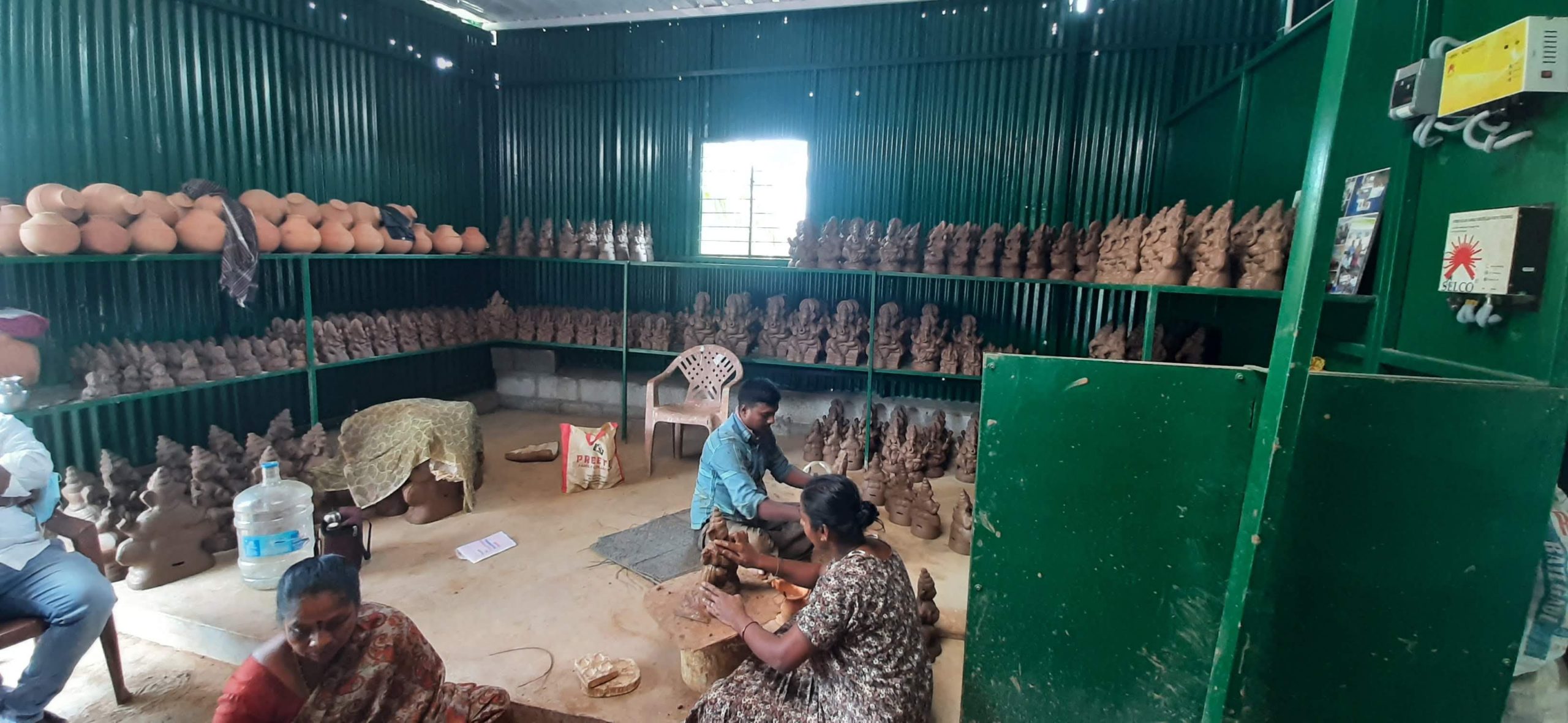Background
Pottery, a conventional art form of India, as a profession faces multiple challenges in terms of productivity, income and inefficient technology. Traditionally, pottery involves a lot of manual labour. Due to low production, many potters have switched to alternate professions for better and secure income sources. In order to preserve an ancient profession, SELCO Foundation identified and designed mechanized interventions to scale. The interventions in the past case studies have successfully accelerated production, reduced input costs (electricity cost), increased power reliability, enabled long-run work hours, and have significantly reduced manual drudgery. The approach to scaling a program intervention is to first test an innovation at a smaller scale, rigorously evaluate it, and scale the pilot up in the same context if it is shown to be successful, as is in this case and other pottery value chain interventions. In particular, this method is now applied by government cooperative societies (Khadi and Village Industries Commission), NGOs with deep local context ( Akshara, Terracota and Max Potteries societies, and REACH) that have created space for piloting and evaluation as a means to test promising solar innovations or tweaks to existing programs. However, there can be important differences in context even within the same state, so it is important to factor in administrative capacity to implement the intervention on a broader scale and to consider potential general equilibrium effects, a model adopted by SELCO Foundation. For example, in Andhra Pradesh, the micro businesses team found that providing solar power as an alternative to grid connection doubled potter’s per day production in the area. The team found that most of the potters already owned the machinery but the efficiency was massively cut short due to lack of reliable power supply and poor load shedding in this context. The team demonstrated the use of solar powered interventions to mobilize and spread awareness in partnership with KVIC and Terracota and Max potter Societies. It increased end user’s participation and confidence in the intervention. This successful demonstration helped scale the program in Andhra Pradesh in partnership with KVIC and Terracota Max Societies. To scale appropriately and effectively, SELCO Foundation and all the implementing partners account for local conditions and implementation capacity, and then adapt programs to that new context accordingly. The Pottery program intervention provides participants with a combination of productive use assets (such as solar powered pottery wheel, blunger, pugmill, efficient kiln), training, access to microfinance institutions/bank loans, and usage/service support. Key questions include how the training component can be made relevant for local markets, whether local financial infrastructure is sufficiently widespread and accessible to facilitate bank loans or end users paying capacity, and what intervention asset would make sense for local conditions. By partnering with organizations that have deep local knowledge, SELCO Foundation team and staff have helped to identify ways in which this program can be adapted to new contexts.
Meeting Energy Requirements
SELCO Foundation (SF) in collaboration with KVIC to spread awareness regarding solar compatible pottery machinery. Accordingly , SF installed demo units at the Common Facility Centre to increase acquaintance. Thereafter, the Foundation solar powered existing pottery wheels for 40 end users. The intervention includes establishing panels and light systems at each users’ workstation to power their pottery wheels. According to personal testimonials by end users, it has significantly increased their confidence in taking bulk orders. Earlier they weren’t able to deliver big orders due to power unreliability during work hours and suffered losses on bulk orders. Other than reliable power supply, end user electricity bills have reduced from Rs. 400 - 500 per month to Rs. 250 - 350. There is a significant growth in production as there is a 20-30% rise in daily productions in the AP cluster. According to SELCO Foundation and its partner organization’s reports, the program intervention has directly impacted 40 end user’s livelihood and positively affected 150 families in this cluster.
Intervention
Individual model: Individual Solar operated pottery wheel- 40 systems. Demo systems at Two Common Facility Centres: Pottery wheel- 2 systems Blunger- 2 systems Pug Mill- 2 systems Kiln- 2 units.
Impact
Impact: Reduced electricity cost per end user per month - (from INR 400-500) to (INR 250 -350) Increased confidence in taking bulk orders which was not possible earlier due to poor load sharing and unreliable electricity Per day production increased by 20-30% Increased work hours not limited by power cuts as the intervention enabled 24/7 accessibility to lighting and energy
